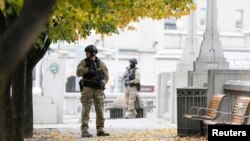From London to Washington, Paris to Rome, authorities are bracing for more lone-wolf terror rampages following last week’s deadly attack by a Muslim convert on an unarmed soldier in the Canadian capital, Ottawa.
That slaying and assault on Canada's parliament building was followed by a hatchet attack on two New York City policemen by a self-radicalized Muslim who reportedly had an obsession with jihadist beheadings in Syria.
The attacks leave Western security experts saying they are increasingly worried about low-tech, almost spontaneous attacks by extremists who are not directed by terror bosses or known to intelligence agencies.
In Italy, security services have increased their surveillance of foreigners living in or passing through the country, the Italian newspaper Corriere della Sera reported. Italy has not directly participated in U.S.-led coalition airstrikes on Islamic State extremists, but it has contributed arms and aid to the Kurds and others fighting the jihadists.
Italy is primarily fearful of lone-wolf attacks such as last year's deadly shooting at Brussels’ Jewish Museum by a French jihadist recently returned from fighting in Syria, says Interior Minister Angelino Alfano.
Lone-wolf assaults by Muslim extremists are not new. In 2009, Nidal Malik Hasan, an American army psychiatrist, murdered 13 of his comrades in a shooting spree at Fort Hood, a Texas military base. And in 2013 two Chechen-American brothers bombed the Boston Marathon using unsophisticated homemade pressure-cooker bombs.
But the pace of attacks is picking up. With at least 3,000 Westerners estimated to have enlisted with jihadist groups in the eastern Meditteranean, the fear is that they will return home with new skills.
“If only a few of them morph from being foreign fighters into terrorists, that will be a big challenge,” cautions former FBI agent Martin Reardon.
Sophisticated social media campaigns are encouraging more lone-wolf attacks.
“If you cannot make it to the battlefield, then bring the battlefield to yourself,” tweeted Aqsa Mahmood, a 20-year-old woman from Glasgow now married to a jihadist in Syria.
Some analysts believe the Western alarm is misplaced. Researchers at the Middle East Media Research Institute (MEMRI), a U.S.-based nonprofit that monitors jihadists, argued in a study of Islamic State’s official writings and speeches that its program is different from that of al-Qaida, authors of the 2001 attacks in New York.
“Unlike al-Qaida," the group said, "the IS places priority not on global terrorism, but rather on establishing and consolidating a state, and hence it defers the clash with the West to a much later stage.”
That stage, though, appears to have come sooner than thought. With the U.S.-led military intervention in Iraq and Syria now under way, the militants are urging sympathizers to lash out at any country that dares to confront them.
Earlier this month, one of the chief propagandists of Islamic State issued a call to arms to Muslims everywhere.
"Do not let this battle pass you by wherever you may be," said Shaykh Abu Muhammad al Adnani, a chief IS propagandist, in a 42-minute speech posted online this month.
"If you can kill a disbelieving American or European - especially the spiteful and filthy French - or an Australian, or a Canadian, or any other disbeliever from the disbelievers waging war, including the citizens of the countries that entered into a coalition against the Islamic State, then rely upon Allah, and kill him in any manner or way however it may be. Do not ask for anyone’s advice and do not seek anyone’s verdict. Kill the disbeliever whether he is civilian or military.”
The number of attacks this year “shows that their propaganda is having some effect,” Senator Dianne Feinstein of California, who chairs the U.S. Senate Intelligence panel, told CNN.
While lone wolf attacks might not kill as many people as large-scale operations, intelligence specialists say they can have a tremendous propaganda effect.
“The degree of violence that is potentially being deployed by these extremists is of special concern - they are wanting to execute someone - behead them - in the street, and the fact that these days people tend to whip out their phones and record things means the impact of such an attack would be huge,” says British threat expert Will Geddes.




